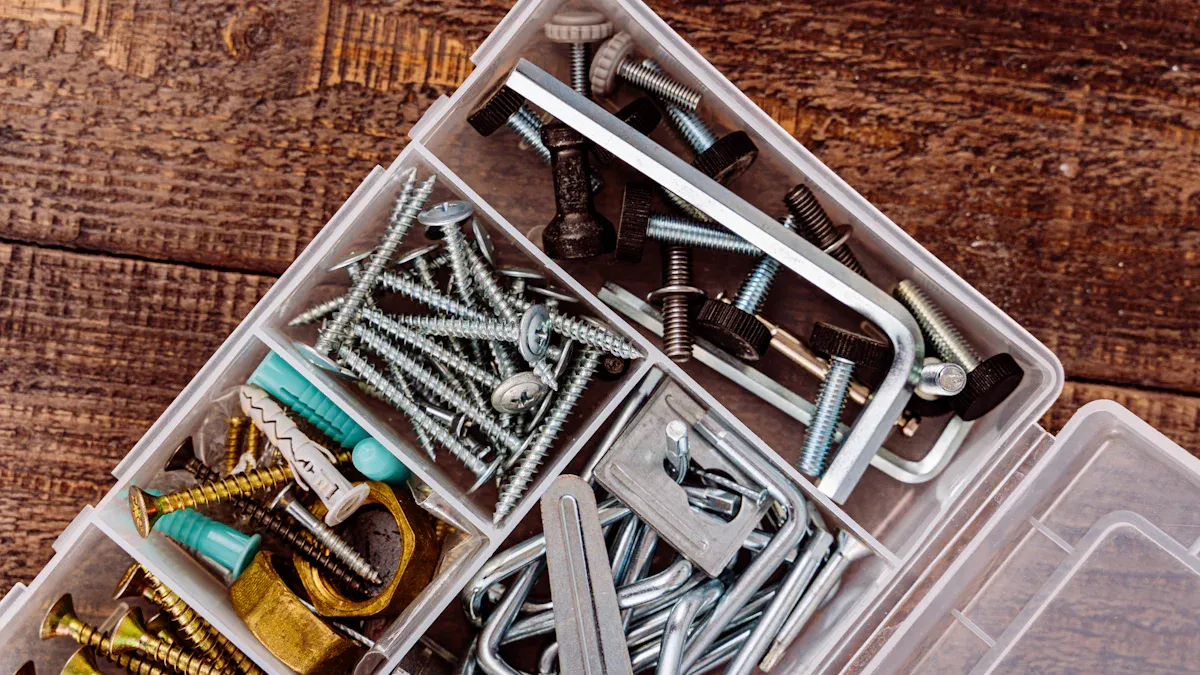
Selecting the right supplier is critical for businesses managing bulk orders. A reliable supplier ensures consistent product quality, timely deliveries, and cost efficiency. Suppliers with robust quality control procedures and certifications minimize risks like defective products or supply chain disruptions. Following a structured B2B supplier checklist can help businesses identify partners who meet OEM manufacturing standards and maintain reliability. These bulk purchase tips safeguard against financial losses and operational delays caused by unreliable suppliers.
Key Takeaways
- Check if suppliers follow OEM standards for making products. This ensures strong and dependable window hardware.
- Ask for product samples before ordering in large amounts. Testing samples makes sure they meet quality and rules.
- Check if a supplier delivers on time. Fast deliveries stop delays and keep work running smoothly.
Key Criteria for Evaluating a Window Hardware Supplier

Product Quality and OEM Manufacturing Standards
Product quality is a cornerstone of supplier evaluation. Reliable suppliers adhere to OEM manufacturing standards, ensuring consistency in meeting product specifications. These standards often include rigorous testing procedures such as durability, load, and environmental testing. For example, durability testing evaluates a product’s ability to withstand wear over time, while environmental testing ensures resistance to dust and water exposure. Suppliers that meet these benchmarks demonstrate their commitment to delivering high-quality window hardware.
Competitive Pricing and Bulk Discounts
Competitive pricing plays a pivotal role in supplier selection. Buyers should assess pricing structures, including volume discounts and trade incentives. Quantity discounts, for instance, reduce per-unit costs, benefiting both buyers and suppliers. Suppliers offering cash discounts for early payments can also improve cash flow management. However, businesses must balance the benefits of bulk purchasing with potential storage costs. Establishing a partnership with a supplier who provides fair pricing and flexible discounts fosters long-term collaboration.
Delivery Reliability and Timelines
Timely delivery is essential for maintaining operational efficiency. Suppliers must demonstrate their ability to meet agreed timelines, even during demand fluctuations. Late deliveries can disrupt production schedules and lead to financial losses. Evaluating a supplier’s logistics capabilities, including their track record for on-time delivery, helps mitigate these risks. A reliable supplier ensures that bulk orders arrive as planned, supporting seamless business operations.
Customer Service and Communication
Effective communication is a hallmark of a dependable supplier. Suppliers should respond promptly to inquiries and provide clear updates on order statuses. Strong customer service includes the ability to customize products based on client needs. Responsiveness not only resolves issues quickly but also builds trust between the buyer and supplier. Businesses should prioritize suppliers who value transparency and maintain open lines of communication.
Certifications and Industry Compliance
Certifications and compliance with industry regulations establish a supplier’s credibility. Adherence to standards such as ISO certifications reflects a commitment to quality and ethical practices. Suppliers lacking proper certifications risk product recalls and audit complications. Companies should verify that their suppliers meet all necessary compliance requirements to avoid potential legal and operational challenges. Documenting this evaluation process ensures accountability and confidence in the supplier relationship.
Actionable Steps to Assess a Supplier
Conduct Thorough Research and Background Checks
Researching a supplier’s history provides valuable insights into their reliability. Businesses should investigate the supplier’s registration details, financial stability, and years of operation. A systematic approach includes reviewing public records, industry reports, and supplier directories. Performing on-site visits allows buyers to observe operations firsthand and verify compliance with OEM manufacturing standards. This step ensures that the supplier has the technical expertise and infrastructure to meet bulk order requirements.
Request Product Samples for Quality Verification
Requesting product samples is an effective way to assess quality before committing to large orders. Buyers should test samples for durability, functionality, and adherence to specifications. For example, product testing can reveal whether the hardware meets environmental resistance standards, such as corrosion or temperature tolerance. Suppliers who provide samples demonstrate transparency and confidence in their offerings. A small trial order can further validate consistency in production quality.
Check References and Customer Reviews
References and reviews offer a glimpse into a supplier’s reputation. Businesses should contact previous clients to inquire about their experiences with the supplier. Questions about delivery reliability, product quality, and customer service help gauge performance. Online reviews and testimonials also provide valuable feedback. Suppliers with positive references and high ratings are more likely to deliver consistent results.
Verify Certifications and Compliance Documents
Certifications and compliance documents establish trustworthiness. Suppliers adhering to industry regulations and holding certifications like ISO demonstrate their commitment to quality and ethical practices. Certificates of Analysis (COAs) verify that products meet customer requirements, reducing risks of returns or complaints. Buyers should request proof of compliance to ensure that the supplier aligns with OEM manufacturing standards.
Evaluate Their Capacity to Handle Bulk Orders
Assessing a supplier’s capacity involves analyzing key performance indicators (KPIs). Metrics like on-time delivery rate, quality defect rate, and response time provide insights into their reliability. For example, a supplier with a high on-time delivery rate ensures seamless operations. Additionally, evaluating their ability to scale production and adapt to urgent requirements highlights long-term viability. Suppliers with robust infrastructure and flexible capabilities are better equipped to handle bulk orders efficiently.
| KPI | Description |
|---|---|
| On-time Delivery Rate | Measures the frequency of meeting agreed delivery timelines. |
| Quality Defect Rate | Captures the number of defective items produced, indicating production inconsistencies. |
| Price Competitiveness | Analyzes prices in relation to market averages to ensure competitiveness. |
| Response Time | Indicates the speed of addressing inquiries, reflecting customer service quality. |
| Capacity and Flexibility | Assesses the ability to scale or adapt, providing insights into long-term viability. |
Red Flags to Avoid Unreliable Suppliers

Lack of Transparency in Pricing or Policies
A trustworthy supplier maintains clear and consistent pricing policies. Hidden fees, vague terms, or sudden price changes often indicate a lack of transparency. Businesses should request detailed quotes that outline costs, including shipping, taxes, and any additional charges. Suppliers unwilling to provide this information may pose financial risks. Transparent pricing fosters trust and ensures that buyers can plan budgets effectively.
Poor Communication or Delayed Responses
Effective communication is essential for a successful supplier relationship. Suppliers who delay responses or provide incomplete information can disrupt operations. For instance, delayed updates on order statuses may lead to production halts or missed deadlines. Reliable suppliers prioritize prompt and clear communication, ensuring that buyers receive timely updates. Businesses should assess a supplier’s responsiveness during initial interactions to avoid future challenges.
Negative Reviews or Unverified References
Customer feedback offers valuable insights into a supplier’s reliability. Negative reviews often highlight recurring issues, such as late deliveries or poor-quality products. Unverified references or a lack of testimonials may signal inexperience or unreliability. Businesses should investigate a supplier’s reputation by consulting online reviews and contacting previous clients. Ignoring these red flags can lead to partnerships with unethical suppliers, potentially damaging a company’s reputation.
- Ignoring supplier red flags has led to cases where suppliers rationalized unethical practices, harming their customers’ reputations.
- Suppliers in dependent relationships may overlook unethical behavior, creating long-term risks.
Inconsistent Product Quality or Missing Certifications
Inconsistent product quality undermines operational efficiency and customer satisfaction. Reliable suppliers maintain high standards by adhering to certifications, such as ISO, which verify product quality and compliance. Missing certifications often indicate a lack of accountability or expertise. Businesses should request these documents to ensure that suppliers meet industry standards.
- Partnering with credible suppliers reduces risks like financial losses and substandard products.
- Certifications confirm that products meet quality benchmarks, ensuring consistency in bulk orders.
Evaluating window hardware suppliers involves assessing product quality, pricing, delivery reliability, and customer service. Conducting thorough research, verifying credentials, and avoiding red flags ensures informed decisions. Building long-term relationships with reliable suppliers offers several advantages:
| Key Benefit | Description |
|---|---|
| Reliability | Reliable suppliers ensure the right items are shipped as per agreed terms for quality and delivery. |
| Stability | Long-term relationships foster stability in procurement processes, reducing risks and uncertainties. |
| Effective Communication | Strong communication leads to better collaboration and problem-solving between partners. |
These partnerships enhance operational efficiency and reduce risks. Businesses should begin their evaluation process today to secure consistent success in bulk orders.
FAQ
1. How can businesses verify a supplier’s certifications?
Request copies of certifications directly from the supplier. Cross-check these documents with industry standards or regulatory bodies to ensure authenticity and compliance.
2. What is the best way to assess product quality before bulk orders?
Request product samples for testing. Evaluate durability, functionality, and adherence to specifications. Conduct small trial orders to confirm consistency in production quality.
3. Why is delivery reliability critical for bulk orders?
Timely deliveries prevent production delays and financial losses. Suppliers with strong logistics capabilities ensure seamless operations and maintain trust in long-term partnerships.
Post time: Mar-28-2025
